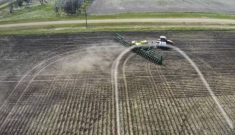Do you really want to get involved? You’re already busier than ever and it’s awfully tempting to simply say no. But then, focus groups are a major way for companies and other groups — even governments — to make sure they deliver what farmers want, so it would be good for them to get the straight goods.
Maybe it should boil down to whether they’ll make efficient use of your time, and whether they’ll actually listen to what you say. But how can you tell?
Read Also

How scientists are using DNA and climate data to breed crops of the future
A method for forecasting how crops will perform in different environments so that plant breeders can quickly select the best parents for new, climate-resilient varieties.
Farmers’ patience with focus groups sometimes wears thin. Ken Motiuk farms at Mundare, Alta. He’s in his mid-50s and says “my trapline of buddies is well-established. They are large, aggressive, good farmers.”
“To get into our heads and get our input, don’t invite us in to a room, pick our brains and give us a cheap lunch,” says Motiuk. “Instead take us for a round of golf in Edmonton where you can pick our brains all day.”
Another Alberta farmer, Jeff Nielsen of Olds says he participates in focus groups from time to time, if they can reach him. “I don’t answer 1-800 numbers any more,” Nielsen laughs. “But sometimes they catch me other ways!”
Usually if he’s asked to participate, Nielsen says it’s because there’s a specific demographic being sought, and the screening interview has specific criteria that need to be met.
Despite the grumbles, though, Motiuk and Nielsen participate in focus groups, primarily out of altruistic reasons, realizing that to improve the products and services available to farmers someone has to step up and provide the feedback companies are seeking
But first, what is a focus group anyway?
Market research falls into two broad categories. First is quantitative research that aims for statistical accuracy. This is achieved with a survey of sometimes thousands of respondents that gives a precise level of confidence in the results, with an accuracy rate typically expressed as a margin of error of plus or minus such and such a per cent.
Second is qualitative research. It can range from in-depth one-at-a-time interviews with selected farmers to focus groups that try to mirror the same experience with a panel of farmers simultaneously. Qualitative market research is more exploratory. Instead of putting a number on whether or not you like a new ad campaign or a new product, it’s more about finding why you think the way you do.
“Focus groups tell you to go north, south, east or west, but just not how far,” says Marinus Van Dijk, senior vice-president of Ipsos Forward Research and managing director of the Ipsos Canadian business.
What’s in it for the companies
When a company is developing a new product or service, or changing a package or advertising campaign, they will often test it first in a focus group.
Derrick Rozdeba is communications manager at Bayer CropScience at its Canadian head office in Calgary, and he uses focus groups on an on-going basis. “A focus group will help you gauge general acceptance of a product or service,” Rozdeba says. “Danger zones or areas of concerns can also be highlighted. I call it ‘disaster check.’”
Down the hall, Brent Collins, Bayer’s manager of business intelligence, uses focus groups to test new product concepts and research directions with farmers, face-to-face.
Like other crop protection and seed companies, Bayer CropScience says it is continually working to develop new technologies to remain on the cutting edge. But with the cost of research, and with intense competition from other companies, it’s essential to get that direction right.
“An innovation that is real for a chemist may not be perceived the same way by farmers,” Collins says. “It may not realize any benefits for their farming operation.”
Focus groups give Bayer a chance to put ideas to the test. And they also give the company a chance to do some creative listening, Collins says. “We may also ask farmers, are there new innovations in formulations or packaging that would benefit your operation in some way?”
Rozdeba thinks focus groups can work. “We can get some great nuggets from focus groups, like, the jug is just too heavy or it’s awkward or difficult to open.”
A good focus group doesn’t just happen though. “The facilitator is key to a good outcome,” says Rozdeba. “Sometimes a strong personality in the group can take over the process, and may even have to be removed. A well-trained and experienced facilitator can often control these issues seamlessly.”
A focus group starts with the client and usually a third-party facilitator determining the question that needs to be answered. A discussion guide is then developed to ensure the topics the client is most interested in or concerned about are addressed.
The client often has a target group for the focus group in mind, for instance, dairy farmers in Ontario or Prairie wheat farmers. Sometimes there are specific requirements, such as farmers who have used — or who have never used — one of the company’s current products or services.
Participants are then recruited. This involves some pre-screening by phone to ensure the participant meets the criteria that have been set up. Examples of questions at this point can include the size of operation, who is the decision-maker, and whether the product or service is currently used or not.
“Ipsos has its own comprehensive database of potential participants,” says Van Dijk, “but clients can also provide us with a list of possible participants — but only, of course, if those farmers have previously given the client permission to share their private contact information with us.”
Once the participants are chosen, they usually receive an incentive, typically cash that sends a signal this is a serious project. And finally, the real key to a successful focus group experience for the client and the participants is a well-trained and experienced facilitator.
Focus groups can be carried out either at the offices of the facilitating company or at a hotel or other location out in the country. If the former, then the client will usually observe the proceedings from behind a window or mirror, and the participants are informed of this. In the latter situation, the client staff will sit discretely at the back of the room and observe without interfering in any way.
What’s in it for farmers?
From the viewpoint of the companies, the big benefit to farmers who participate in focus groups is that they get extra exposure to the new technologies and ideas the companies are testing.
In fact, from the feedback that Rozdeba, Hall and Van Dijk get, the farmers themselves report that these insights are the biggest benefit they get.
That said, don’t expect to know exactly what difference your own input makes. In some cases the survey company may send out a report after the focus groups are all wrapped up. They might share an executive summary with participants, depending on the topic, but only if the information isn’t deemed sensitive by the client.
Still, farmers do get a great opportunity to network with other farmers who are typically facing with similar challenges.
They can be good farmers to get to know. Companies target so-called “early adopter” farmers and those with a reputation for liking to be on the cutting edge of technology and management. They look for farmers who want to be engaged in where their industry is heading, and those who want to influence that direction. In other words, from a farm point of view, these are good people to share ideas with.
Meanwhile, the companies are also trying to reduce the negatives involved with focus groups. Recognizing the demands on farmers’ time, there are technological developments in the way qualitative data is being gathered. “Ipsos conducts online focus groups,” points out Van Dijk. “Sometimes these can be conducted over a few days. The farmer receives a link and password by email, and ‘chats’ with other farmers online about whatever we’re investigating.”
An extra benefit of this high-tech approach is that it widens the geographic area that can be tested, although companies do conduct some telephone focus groups too, and they use in-depth interviews with single farmers and online community groups.
Talking to farmers, it’s less about the benefits they receive than their ability to help shape the products and programs of the future. It’s a recognition that companies do need this information in order to bring the products and services to market that farmers are going to need. And it seems it really depends where a farmer is at in his career too.
Motiuk understands that with family commitments and with business and public service responsibilities, many farmers simply don’t have any free time to give for this sort of activity.
Nielsen agrees, and adds that because of the way focus groups are sometimes structured — sometimes without telling the farmers who the client is until after the discussions are over — it can be a frustrating experience.
Still, he says, “I also realize they are looking for unbiased data.”CG














